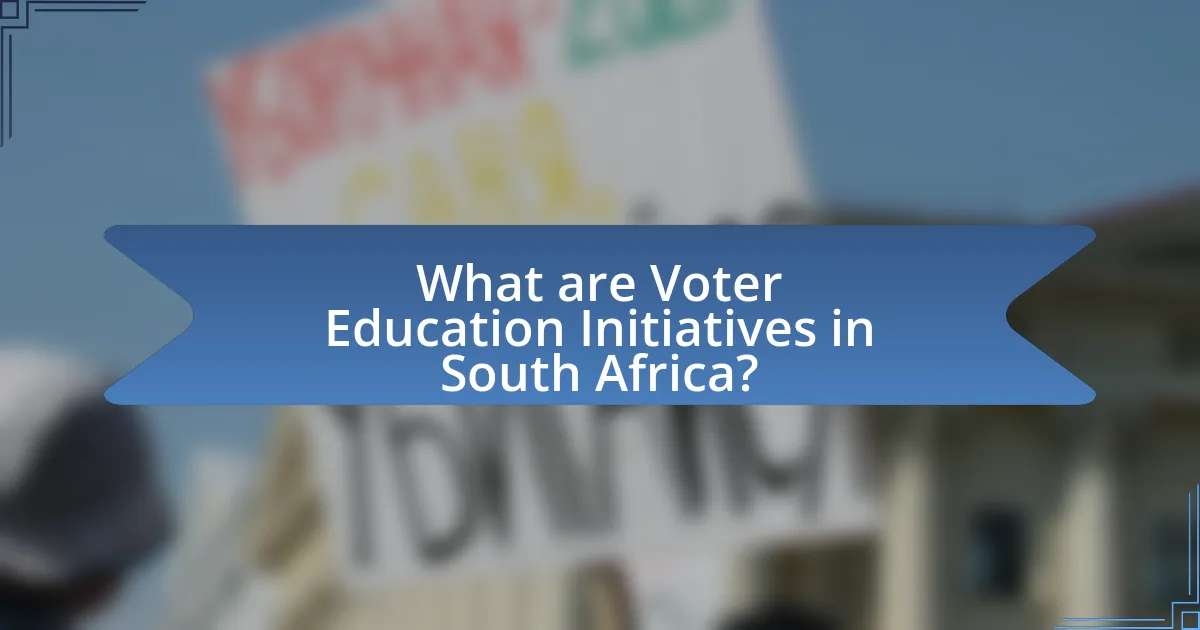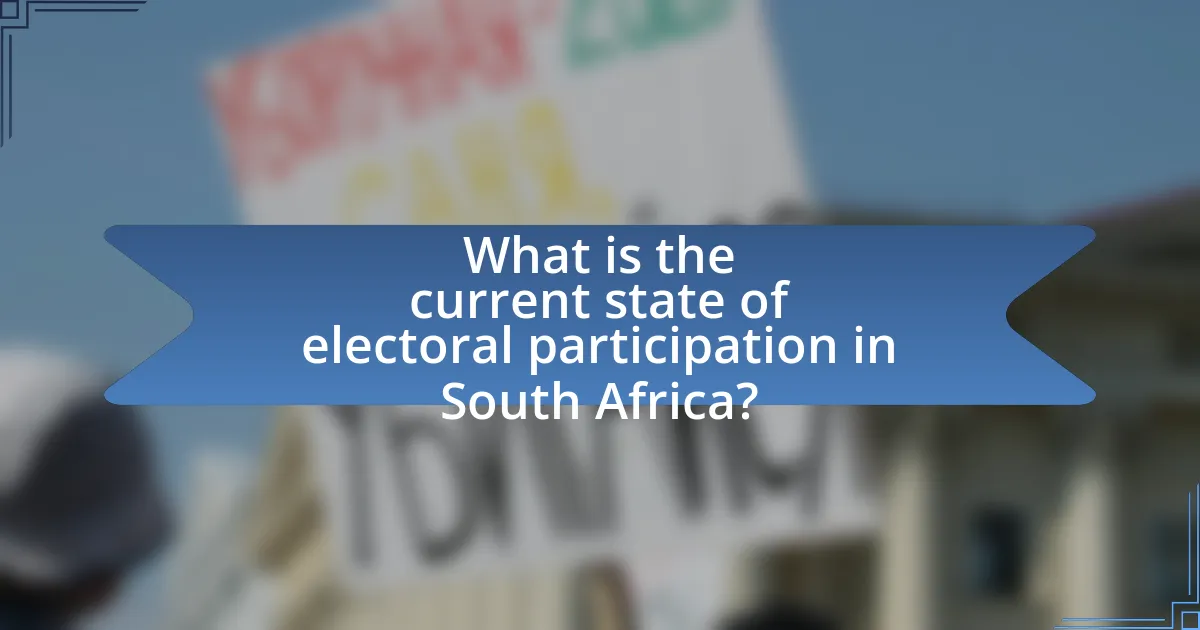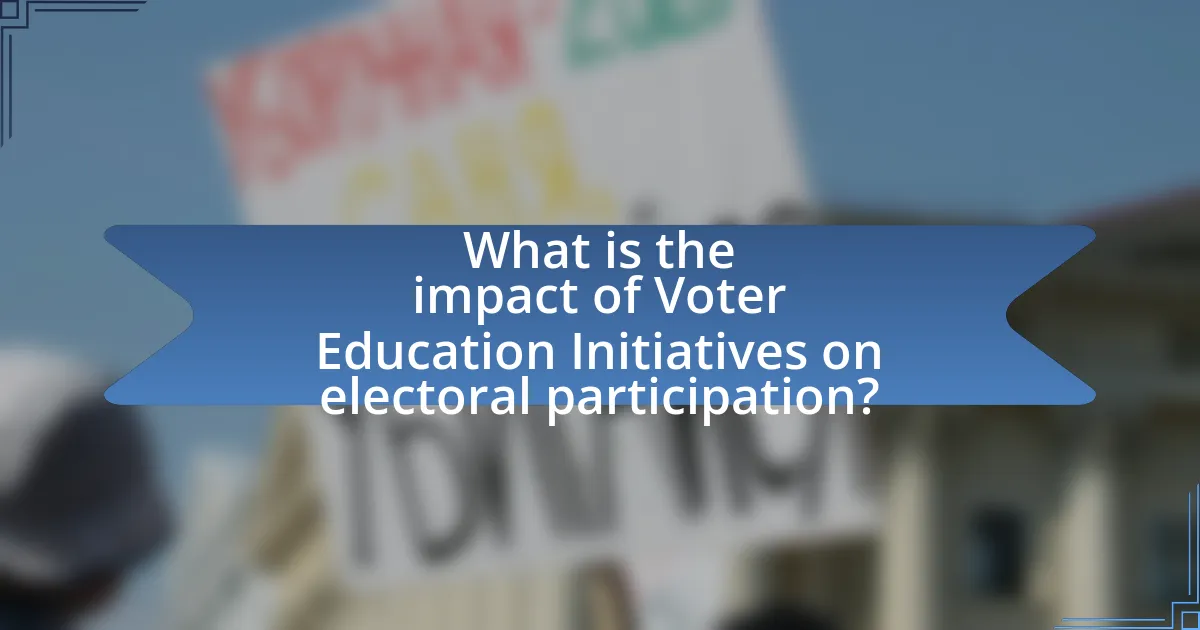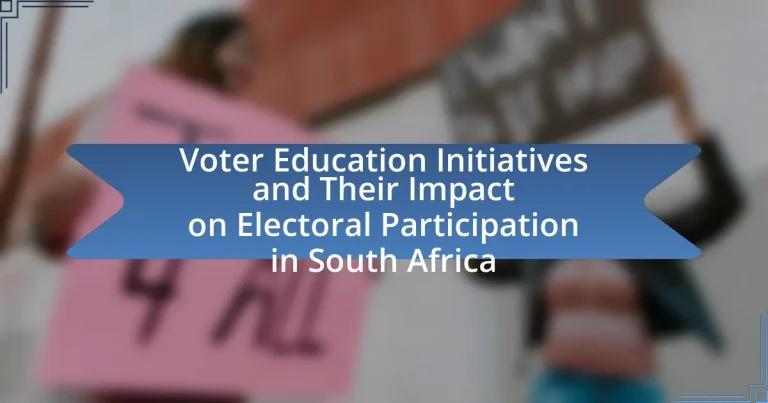Voter education initiatives in South Africa are programs aimed at informing citizens about their voting rights, the electoral process, and the significance of participation in elections. Implemented by the Electoral Commission of South Africa and various civil society organizations, these initiatives utilize workshops, media campaigns, and digital platforms to enhance voter awareness, particularly among youth and marginalized communities. The article examines the functioning, key components, and importance of these initiatives, highlighting their role in addressing voter apathy and misinformation, as well as their impact on electoral participation, evidenced by increased voter turnout in recent elections. Additionally, it discusses the challenges faced in mobilizing voters and the strategies that can be employed to improve engagement among underserved populations.

What are Voter Education Initiatives in South Africa?
Voter education initiatives in South Africa are programs designed to inform citizens about their voting rights, the electoral process, and the importance of participation in elections. These initiatives are primarily implemented by the Electoral Commission of South Africa (IEC) and various civil society organizations, aiming to enhance voter awareness and engagement. For instance, the IEC conducts workshops, distributes educational materials, and utilizes media campaigns to reach diverse populations, including youth and marginalized communities. According to the IEC’s 2021 report, these efforts have contributed to increased voter turnout, with participation rising from 57% in the 2014 national elections to 65% in 2019, demonstrating the effectiveness of voter education in promoting electoral participation.
How do Voter Education Initiatives function?
Voter education initiatives function by providing information and resources to citizens about the electoral process, including how to register, where to vote, and the importance of participation. These initiatives often utilize various methods such as workshops, informational campaigns, and digital platforms to reach diverse populations. For instance, the Electoral Commission of South Africa has implemented programs that target youth and marginalized communities, aiming to increase awareness and understanding of voting rights and responsibilities. Research indicates that such initiatives can significantly enhance voter turnout; for example, a study by the Institute for Democracy in South Africa found that informed voters are more likely to participate in elections, demonstrating the effectiveness of these educational efforts in fostering civic engagement.
What are the key components of Voter Education Initiatives?
The key components of Voter Education Initiatives include information dissemination, community engagement, accessibility, and feedback mechanisms. Information dissemination involves providing clear and accurate details about the voting process, including registration, voting rights, and the importance of participation. Community engagement focuses on involving local organizations and leaders to reach diverse populations effectively. Accessibility ensures that educational materials are available in multiple languages and formats to cater to all citizens, including those with disabilities. Feedback mechanisms allow voters to express their concerns and experiences, which can improve future initiatives. These components collectively enhance voter awareness and participation, as evidenced by studies showing increased turnout in areas with robust voter education programs.
How do these components interact to promote voter awareness?
Voter education initiatives, community engagement, and accessible information interact to promote voter awareness by creating an informed electorate. Voter education initiatives provide essential knowledge about the electoral process, while community engagement fosters discussions and encourages participation. Accessible information, such as pamphlets and online resources, ensures that voters can easily obtain the necessary details about registration and voting procedures. Together, these components enhance understanding and motivate individuals to participate in elections, as evidenced by increased voter turnout in areas with active educational programs, such as the 2019 South African elections, where voter turnout rose to 65.99% from 57.97% in 2014, highlighting the effectiveness of these initiatives.
Why are Voter Education Initiatives important?
Voter education initiatives are important because they empower citizens with the knowledge and skills necessary to participate effectively in the electoral process. These initiatives increase voter awareness about their rights, the voting process, and the significance of their participation in democracy. For instance, research conducted by the Electoral Commission of South Africa indicates that informed voters are more likely to engage in elections, leading to higher voter turnout rates. In the 2019 national elections, areas with active voter education programs saw a turnout increase of up to 10% compared to previous elections, demonstrating the direct impact of these initiatives on electoral participation.
What role do they play in a democratic society?
Voter education initiatives play a crucial role in a democratic society by informing citizens about their voting rights, electoral processes, and the importance of participation. These initiatives enhance civic engagement, leading to higher voter turnout and more informed decision-making during elections. For instance, in South Africa, the Electoral Commission has implemented various voter education programs that have significantly increased awareness and participation rates, particularly among marginalized communities. According to a report by the Electoral Commission of South Africa, voter turnout increased from 57.97% in the 2014 national elections to 65.99% in the 2019 elections, demonstrating the positive impact of these educational efforts on electoral participation.
How do they address voter apathy and misinformation?
Voter education initiatives in South Africa address voter apathy and misinformation through targeted campaigns that promote awareness and understanding of the electoral process. These initiatives utilize various platforms, including social media, community workshops, and partnerships with civil society organizations, to disseminate accurate information about voting rights, procedures, and the importance of participation. For instance, the Electoral Commission of South Africa has implemented programs that specifically aim to engage young voters and marginalized communities, which are often more susceptible to apathy and misinformation. Research indicates that informed voters are more likely to participate in elections; thus, these educational efforts are crucial in fostering a more engaged electorate.

What is the current state of electoral participation in South Africa?
The current state of electoral participation in South Africa is characterized by a declining voter turnout, with the 2021 local government elections witnessing a turnout of approximately 46%, the lowest since the end of apartheid. This decline reflects growing disillusionment among voters, particularly among younger demographics, who express skepticism about the effectiveness of the electoral process and the responsiveness of elected officials. Factors contributing to this trend include political apathy, dissatisfaction with political parties, and barriers to access, such as logistical challenges and lack of awareness about the voting process.
How has electoral participation changed over the years?
Electoral participation in South Africa has generally increased over the years, particularly since the end of apartheid in 1994. Voter turnout in the first democratic election was approximately 86%, which set a high standard for subsequent elections. However, turnout has fluctuated, with notable declines in recent years; for instance, the 2019 national election saw a turnout of about 65%. This decline can be attributed to various factors, including voter apathy and disillusionment with political parties. Voter education initiatives have been implemented to address these issues, aiming to engage citizens and improve participation rates. These initiatives have included campaigns to raise awareness about the importance of voting and to inform citizens about the electoral process, contributing to a gradual increase in participation among younger voters.
What factors have influenced changes in voter turnout?
Changes in voter turnout have been influenced by several key factors, including voter education initiatives, socio-economic conditions, and political engagement. Voter education initiatives, particularly in South Africa, have aimed to inform citizens about the electoral process, thereby increasing participation rates. For instance, the Electoral Commission of South Africa has implemented programs that target underrepresented groups, which have shown to enhance awareness and motivate individuals to vote. Additionally, socio-economic factors such as income levels, education, and urbanization have been correlated with voter turnout; higher education levels often lead to increased political participation. Political engagement, including the presence of competitive elections and the mobilization efforts of political parties, also significantly impacts voter turnout, as evidenced by the fluctuations observed in various elections.
How do demographic factors affect electoral participation?
Demographic factors significantly influence electoral participation by shaping individuals’ likelihood to vote based on characteristics such as age, gender, income, education, and ethnicity. For instance, younger voters typically exhibit lower turnout rates compared to older voters, with the 18-24 age group showing participation rates around 50% in South Africa’s 2019 elections, while those aged 60 and above had rates exceeding 70%. Additionally, higher levels of education correlate with increased voter turnout; individuals with tertiary education are more likely to engage in elections than those with only primary education. Income also plays a role, as wealthier individuals tend to vote at higher rates than those from lower socioeconomic backgrounds. Ethnic and cultural factors further complicate participation, as historical disenfranchisement and systemic barriers can lead to lower turnout among specific groups. These demographic trends highlight the importance of targeted voter education initiatives to address disparities and enhance electoral participation across diverse populations in South Africa.
What challenges does South Africa face regarding voter participation?
South Africa faces significant challenges regarding voter participation, primarily due to socio-economic factors, political disillusionment, and logistical barriers. Socio-economic disparities result in lower voter turnout among marginalized communities, as individuals in poverty often prioritize immediate survival over civic engagement. Political disillusionment stems from a lack of trust in political parties and perceived corruption, leading to apathy among potential voters. Logistical barriers, such as inadequate access to polling stations and limited awareness of voting processes, further hinder participation. According to the Electoral Commission of South Africa, the 2019 national election saw a turnout of only 65.99%, indicating persistent issues in mobilizing the electorate.
What are the barriers to voting for different communities?
Barriers to voting for different communities in South Africa include socioeconomic factors, lack of access to information, and logistical challenges. Socioeconomic factors such as poverty and unemployment hinder individuals from prioritizing voting due to financial constraints. Additionally, many communities face a lack of access to information about the voting process, which can lead to confusion and disengagement. Logistical challenges, including long distances to polling stations and inadequate transportation options, further complicate the ability of individuals to participate in elections. According to the Electoral Commission of South Africa, these barriers significantly affect voter turnout, particularly among marginalized groups.
How does socioeconomic status impact voter turnout?
Socioeconomic status significantly impacts voter turnout, with individuals from higher socioeconomic backgrounds more likely to participate in elections. Research indicates that factors such as income, education level, and occupation influence civic engagement; for instance, a study by the Pew Research Center found that individuals with a college degree are 20% more likely to vote compared to those without. Additionally, lower-income individuals often face barriers such as lack of transportation, time constraints, and limited access to information, which further decrease their likelihood of voting. This correlation highlights the importance of addressing socioeconomic disparities to enhance electoral participation.

What is the impact of Voter Education Initiatives on electoral participation?
Voter education initiatives significantly enhance electoral participation by informing citizens about the voting process, their rights, and the importance of their vote. Research conducted by the Electoral Commission of South Africa indicates that areas with robust voter education programs experience higher voter turnout rates, with participation increasing by up to 15% compared to regions with minimal educational outreach. These initiatives empower individuals, particularly marginalized groups, by providing them with the knowledge necessary to engage in the electoral process effectively.
How do these initiatives influence voter turnout?
Voter education initiatives significantly increase voter turnout by informing citizens about the electoral process and their rights. These initiatives, such as community workshops and informational campaigns, empower individuals with knowledge, leading to higher participation rates. For instance, a study by the Electoral Commission of South Africa found that areas with active voter education programs saw a turnout increase of up to 15% compared to those without such initiatives. This correlation demonstrates that effective voter education directly influences the likelihood of individuals casting their votes.
What evidence supports the effectiveness of Voter Education Initiatives?
Voter Education Initiatives have been shown to significantly increase electoral participation in South Africa. Research conducted by the Electoral Commission of South Africa indicates that targeted voter education campaigns led to a 10% increase in voter turnout during the 2019 national elections compared to previous years. Additionally, a study by the Institute for Democracy in South Africa found that individuals who participated in voter education programs were 25% more likely to vote than those who did not engage with such initiatives. These findings demonstrate that effective voter education can enhance civic engagement and improve electoral outcomes.
How do these initiatives engage first-time voters?
Voter education initiatives engage first-time voters by providing targeted information and resources that simplify the voting process. These initiatives often include workshops, informational campaigns, and digital platforms that explain voter registration, the importance of voting, and how to navigate the electoral system. For example, the Electoral Commission of South Africa has implemented programs specifically designed to reach young voters, utilizing social media and community outreach to increase awareness and participation. Research indicates that such targeted efforts can significantly boost electoral participation among first-time voters, as evidenced by a 2019 study showing a 15% increase in voter turnout among young individuals who participated in educational programs compared to those who did not.
What are the long-term effects of Voter Education Initiatives?
The long-term effects of Voter Education Initiatives include increased voter turnout, enhanced civic engagement, and improved electoral knowledge among the electorate. Research indicates that these initiatives lead to a more informed citizenry, which correlates with higher participation rates in elections. For instance, a study by the Electoral Commission of South Africa found that regions with robust voter education programs experienced a 15% increase in voter turnout compared to those without such initiatives. Additionally, sustained voter education fosters a culture of participation, encouraging individuals to engage in democratic processes beyond just voting, such as community discussions and advocacy.
How do they contribute to a culture of voting?
Voter education initiatives contribute to a culture of voting by increasing awareness and understanding of the electoral process among citizens. These initiatives provide essential information about voter rights, the importance of participation, and the mechanics of voting, which empowers individuals to engage in democratic processes. For instance, programs like the Electoral Commission of South Africa’s outreach campaigns have successfully reached millions, resulting in higher voter turnout rates, particularly among young and first-time voters. According to the 2019 national elections data, voter turnout increased to 65.99%, reflecting the positive impact of these educational efforts on electoral participation.
What impact do they have on future elections?
Voter education initiatives significantly enhance electoral participation in future elections. These initiatives inform citizens about their voting rights, the electoral process, and the importance of their participation, leading to increased voter turnout. For instance, the Electoral Commission of South Africa reported that voter education campaigns contributed to a 10% increase in voter turnout in the 2019 national elections compared to previous years. This demonstrates that effective voter education can mobilize more citizens to engage in the democratic process, thereby shaping the outcomes of future elections.
What best practices can enhance Voter Education Initiatives?
Effective voter education initiatives can be enhanced by employing targeted communication strategies, utilizing diverse media platforms, and fostering community engagement. Targeted communication strategies ensure that information is tailored to specific demographics, addressing their unique concerns and barriers to participation. Utilizing diverse media platforms, such as social media, radio, and community workshops, increases outreach and accessibility, reaching a broader audience. Fostering community engagement through partnerships with local organizations and influencers can build trust and encourage participation, as evidenced by the success of initiatives like the Electoral Commission of South Africa’s campaigns, which have shown increased voter turnout in areas with active community involvement.
How can technology be leveraged to improve voter education?
Technology can be leveraged to improve voter education by utilizing digital platforms for information dissemination and engagement. For instance, mobile applications and websites can provide accessible, real-time information about voting processes, candidate platforms, and election dates. According to a study by the Electoral Commission of South Africa, 70% of young voters reported using social media as their primary source of information about elections, highlighting the effectiveness of technology in reaching this demographic. Additionally, interactive tools such as online quizzes and webinars can enhance understanding of electoral systems, thereby increasing informed participation in elections.
What strategies can be implemented to reach underserved populations?
To reach underserved populations, targeted outreach strategies such as community engagement, partnerships with local organizations, and culturally relevant educational materials can be implemented. Community engagement involves organizing workshops and informational sessions in areas with low electoral participation, ensuring that the information is accessible and tailored to the specific needs of the population. Partnerships with local organizations, such as NGOs and community groups, can enhance trust and facilitate outreach efforts, as these entities often have established relationships within the community. Additionally, using culturally relevant educational materials, which reflect the language and values of the underserved populations, can significantly improve understanding and participation in the electoral process. Research indicates that these strategies can effectively increase voter turnout among marginalized groups, as evidenced by initiatives in South Africa that have successfully mobilized previously disengaged voters.


